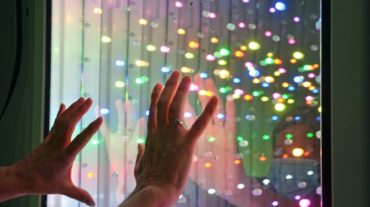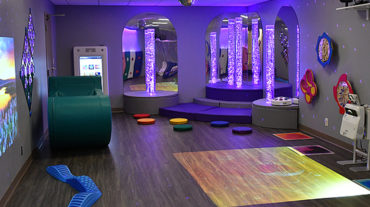By Brian Selders
October 5, 2018
As the diagnoses of autism, individuals with multiple disabilities and an ever-aging population continues to rise, the need for sensory integration that assists with improving the sensory and behavioral needs of clients and their families has become vital. In 2016, Northwest Special Recreation Association (NWSRA), located in Rolling Meadows, IL, opened the Snoezelen Sensory Room. Through technology and innovative design, the Snoezelen room is a controlled multi-sensory environment that helps to create a therapeutic alliance between the client and Certified Therapeutic Recreation Specialist (CTRS) as well as a safe place to develop life skills. NWSRA's vision is to provide meaningful, therapeutic and productive play in the Snoezelen Sensory Room through therapy sessions.
The goals of the sensory therapy are individualized and change from client to client. Each Sensory therapy session is unique to each client's needs. Certified Therapeutic Recreation Specialists (CTRS) work to create a balanced sensory life through goals related to:
-
- Physical Improvement: fine and gross motor
- Cognitive Improvement: problem solving and decision making
- Emotional Improvement: cooperation/collaboration and increased confidence
- Affective Improvement: regulation of feelings and emotional expression
- Social Improvement: verbal and nonverbal communication
- Linguistic Improvement: utilizing descriptive and expressive language
The Snoezelen Sensory Room is designed to deliver stimuli to various senses and is used to provide multi-sensory or single sensory focus. Through allowing an individual to participate at their own free will in a safe environment, the CTRS will help maximize the individual's potential to focus, feel in control, make choices and reduce pain and anxiety both mentally and physically. The population that NWSRA serves rarely, if ever, are able to experience the world with all their senses. Limitations of behavioral issues, anxiety, pain and other issues create obstacles to their enjoyment of life. Once inside the Snoezelen Sensory Room, these obstacles and barriers are removed so the individual can begin to learn how to process sensory input. Building and utilizing this room makes a world of difference to their lives.
To address the need for increased sensory integration options, NWSRA staff connected with professionals on local, state, national and international levels to find what was currently being done to address sensory integration and identify innovative solutions. A small research study carried out in Brussels, Belgium compared the behavior of nine adult clients with profound autism in both classroom and Snoezelen settings. Though individual results varied, the study claimed a 50% reduction in distress and stereotypical behavior, and seventy-five percent less aggression and self-injury in the Snoezelen environment. NWSRA identified Flaghouse, Inc. as a partner capable of implementation of the Snoezelen sensory environment. NWSRA staff worked closely with Flaghouse, Inc. to choose the appropriate sensory equipment that would provide the widest range of sensory integration options for therapists and their clients within the room.
Upon the completion of the project, NWSRA implemented one of the first Snoezelen certified sensory rooms for a Special Recreation Association (SRA) or Park District in the State of Illinois. Through the use of the NWSRA Snoezelen Room, certified staff provide Sensory Therapy Programs. This is an innovative approach toward providing clients the unique tools needed to enhance and unlock their own abilities. Snoezelen therapy relates to the interdependence of both the space (the physical environment) and the "client-centered" approach of the therapist (the human connection). The specially designed sensory environment together with the input of the CTRS, changes can be initiated within individuals that experience sensory overload or sensory deprivation by controlling the sensory input, helping to reducing anxiety/pain (both physical and emotional), increase opportunities for focus and attention and modulate sensory related behaviors.
Snoezelen Sensory Therapy has been an overwhelming success for the community. One client experiences frequent small seizures that reoccur throughout the day. The small seizures often cause her to "zone out." When she is in the sensory room staff have observed far less seizure activity and her ability to stay engaged has improved with use of the room and she stays focused for much longer.
A young adult with autism uses the Snoezelen Sensory Room daily for the last 20 minutes of his Adult Day Program. The room helps ease his transition from his day program to home, bringing his anxiety to level that is manageable. At times you may find him wrapped amongst bubble tubes paying close attention to the vibrations from the bubbles or draped in fiber optics, letting the pressure from the fiber optics hug him. Last year he became extremely ill and was in the hospital for months. Staff were able to send a video of the bubble tubes and the Snoezelen Sensory Room to him and his mom. His mom said it was the first smile she saw in weeks while he was in the hospital. He was so weak from being sick but he would watch the video of the bubble tubes / "his" sensory room over and over.
In terms of sustainability, Snoezelen Sensory Therapy sessions cover any ongoing maintenance of the room as well as staff costs through registration fees. Due to the enormous popularity of the Snoezelen Sensory Room within the community, the need for additional Snoezelen Rooms has become evident. To accommodate this expansion, NWSRA has worked closely with its fundraising arm, SLSF, to continue to engage donors, sponsors, foundations and other community partners to continue to build additional Snoezelen Sensory Rooms throughout its service area. Due to the success of fundraising efforts, NWSRA opened its second Snoezelen Room in Hanover Park in October, and looks forward to opening the third in Mt. Prospect in 2019. To learn more about the NWSRA Snoezelen Sensory Room, visit www.nwsra.org/imagine.
Click here to read the full article on The Daily Herald.





